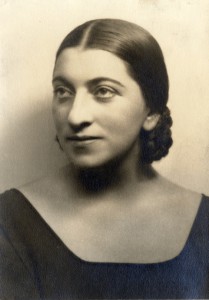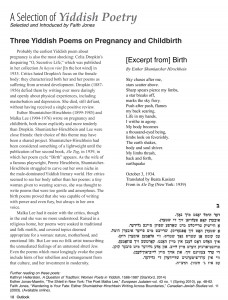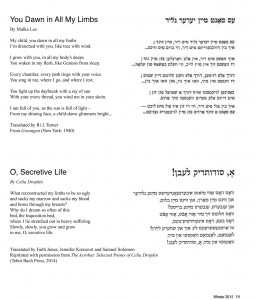"The poems poured out of her": A Daughter's Encounter with Her Mother's Poetry
by ROBERTA NEWMAN

When Yvette Marrin received the poem by her mother from translator Ri Turner (an alumnus of YIVO's Uriel Weinreich Summer Program in Yiddish Language, Literature, and Culture), she was stunned. It wasn't the first time she'd been contacted by scholars about her mother, the Yiddish poet Malka Lee, but this time was different. “I sat there totally stunned. When I checked the date the book was published, I realized the book was about me.”
Growing up, Marrin, president and co-founder of the National Cristina Foundation, an organization that facilitates the donation of computers to not-for-profits, had, of course, been aware of her famous mother's dedication to writing. "Every morning, she would wake up and immediately write down a poem before she made breakfast for her children or was even willing to talk to anyone. These fully formed poems just poured out of her.” But she never really spoke much about her poetry to her children, who, naturally enough, related to her as their mother, rather than as an artist and public figure.
The poem, "Es togt mayn yeder glid" (You Dawn in All My Limbs), first appeared in Malka Lee's Gezangen (Songs), in 1940, a few years after Marrin was born. Turner translated it for an article about Yiddish poems on pregnancy and childbirth selected by Faith Jones for publication in Outlook: Canada’s Progressive Jewish Magazine. "I realized that the child she was writing about in this poem was me."
Malka Leopold-Rappaport (1904-1976) wrote under the pen name of Malka Lee. She was born in a Hasidic family in Monastrishtsh in Galicia and immigrated to the United States in 1921. She attended Hunter College and the Jewish Teachers Seminary and married the writer Aaron Rappaport. She and her husband managed a bungalow colony in High Falls, New York, that was popular with Yiddish intellectuals and writers. Malka herself was an acclaimed poet. She was devastated by the loss of her family during the Holocaust, and much of her poetry from the 1940s and 1950s expresses her intense grief over the murder of her family and the destruction of Jewish Eastern Europe.
But the woman her daughter encountered in the poems in Gezangen was not yet in mourning. “This was a time in my mother’s life before the stress of what happened in Europe to her family and community completely overwhelmed her,” Marrin notes. "Reading these poems so many years later, I found myself face to face with my mother as a young woman, my mother as an artist."


—Faith Jones, "A Selection of Yiddish Poetry: Yiddish Poems on Pregnancy and Childbirth." Outlook: Canada’s Progressive Jewish Magazine (Winter 2015) Courtesy of Outlook: Canada’s Progressive Jewish Magazine
It was no accident, she suggests, that her mother entitled her book Gezangen. "She loved Walt Whitman and here there are echoes of his poem, 'I Hear America Singing'. In fact, there is a line there that begins 'The delicious singing of the mother'.” Marrin, born at the end of the Great Depression, always felt that her mother regarded her as a new opportunity, indeed, a "child dawn."
In the poem, Marrin points out, Lee marvels over the intimacy of creation. The English translation includes the term "Genesis" though the term does not explicitly appear in the Yiddish original. "I think that Turner really picked up on a nuance that another translator might have missed," Marrin comments. "In fact, my Yiddish name is Khave, Eve. And my mother always called me vald kind, which can be translated as 'child of the garden'. Reading this poem now, over seventy years after she wrote it, my emotion was so strong I felt as if I had been touched by the hand of God. I was full of feeling about what it means to be created and to be one with the mother who is the vehicle of the creation of life."
“It was a gift to encounter my mother this way,” Marrin notes. "And it's amazing that all this time my mother was waiting for me between the covers of this book."
The Papers of Malka Lee in the YIVO Archives include her manuscripts, as well as several hundred letters from Yiddish literary, artistic and cultural figures, including Menahem Boraisha, Marc Chagall, Daniel Charney, Solomon Dingol, Aaron Glanz- Leieles, David Ignatoff, Leon Kobrin, H. Leivick, Itzik Manger, Kalman Marmor, Jacob Mestel, Kadia Molodowsky, Shmuel Niger, Joseph Opatoshu, Melech Ravitch, Abraham Reisen, Maurice Schwartz, Zalman Shneur, and Abraham Sutzkever. Eight books of her poetry can be found in the YIVO Library.




